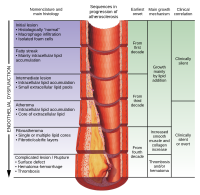
Photo from wikipedia
Lipoprotein(a) (Lp(a)) is a low-density lipoprotein (LDL) cholesterol-like particle bound to apolipoprotein(a). Increased Lp(a) levels are an independent, heritable causal risk factor for atherosclerotic cardiovascular disease (ASCVD) as they are… Click to show full abstract
Lipoprotein(a) (Lp(a)) is a low-density lipoprotein (LDL) cholesterol-like particle bound to apolipoprotein(a). Increased Lp(a) levels are an independent, heritable causal risk factor for atherosclerotic cardiovascular disease (ASCVD) as they are largely determined by variations in the Lp(a) gene (LPA) locus encoding apo(a). Lp(a) is the preferential lipoprotein carrier for oxidized phospholipids (OxPL), and its role adversely affects vascular inflammation, atherosclerotic lesions, endothelial function and thrombogenicity, which pathophysiologically leads to cardiovascular (CV) events. Despite this crucial role of Lp(a), its measurement lacks a globally unified method, and, between different laboratories, results need standardization. Standard antilipidemic therapies, such as statins, fibrates and ezetimibe, have a mediocre effect on Lp(a) levels, although it is not yet clear whether such treatments can affect CV events and prognosis. This narrative review aims to summarize knowledge regarding the mechanisms mediating the effect of Lp(a) on inflammation, atherosclerosis and thrombosis and discuss current diagnostic and therapeutic potentials.
Journal Title: Molecules
Year Published: 2023
Link to full text (if available)
Share on Social Media: Sign Up to like & get
recommendations!